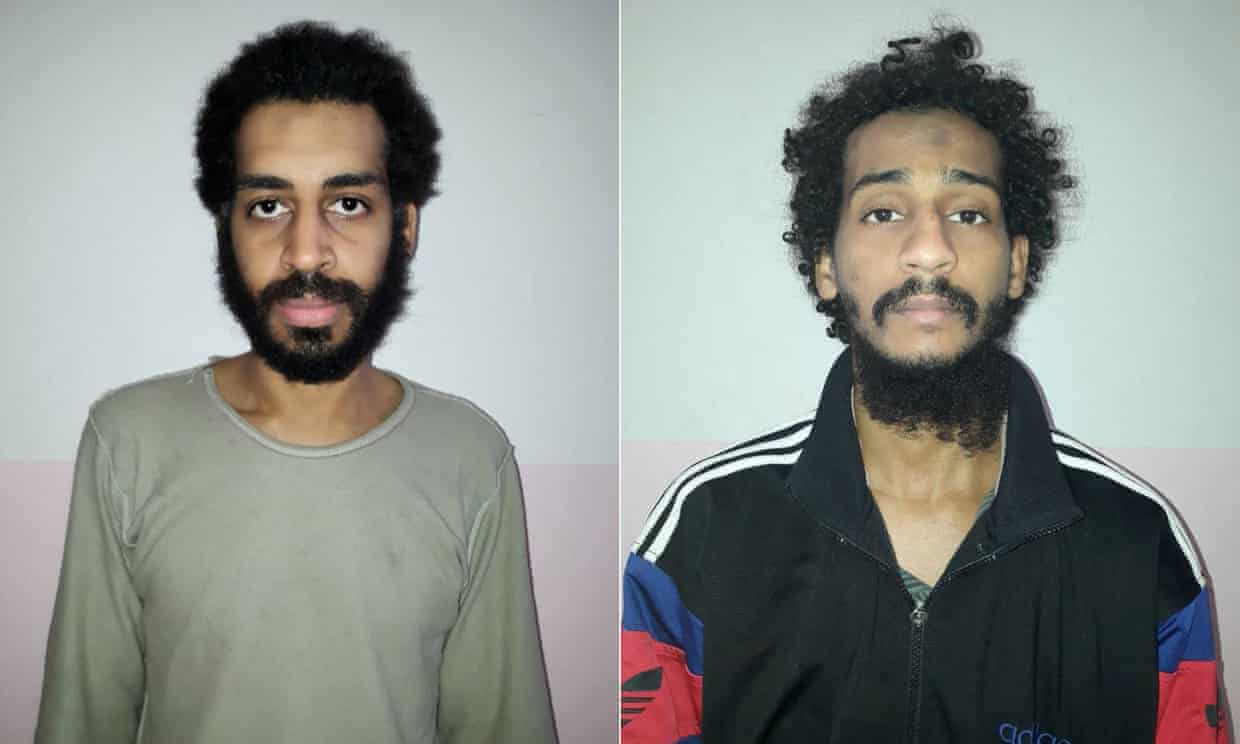European nations should do the right thing and bring home the extremists they exported
https://arab.news/rf7nc

The case of El-Shafee El-Sheikh was back in the news this week. He is one of the most notorious terrorists produced by the West in recent decades, although many will not be familiar with his name.
Together with Mohammed Emwazi, Alexanda Kotey and Aine Davis, he was allegedly one of four British extremists fighting for Daesh, collectively known as “The Beatles,” who were assigned to guard foreign hostages. Their notoriety comes from the fact that they are believed to have murdered, on camera, at least 29 people, including two Americans, two Britons, two Japanese and 22 Syrians.
El-Sheikh does not deny being a member of Daesh, although he denies the allegations of murder and torture. He and Kotey were captured by Kurdish forces in Syria in 2018 and handed over to the US. They remain in military custody in Iraq.
This week, El-Sheikh’s mother lost a final legal battle in her efforts to prevent British intelligence services from handing over evidence they gathered against El-Sheikh and Kotey to US authorities ahead of a trial.
In the absence of that evidence, the US was threatening to transfer the pair into Iraqi custody, where they would likely face a rapid trial and possible execution.
El-Sheikh’s mother also lost a case before the English High Court last year during which it was argued that the transfer of evidence to authorities in the US breached data protection rights. She appealed to the Supreme Court, and won on the grounds that her son might face the death penalty. Since then, however, the US government has given assurances that it will not seek the death penalty in the case, which is why the latest court ruling cleared the way for the evidence to be handed over.
There is another aspect to this case. Just as in the cases of Shamima Begum and a number of other Britons who traveled to join Daesh, El-Sheikh and Kotey were stripped of their British citizenship. “Not our problem,” was the attitude of the British government. It was, in effect, throwing its own dirty laundry into a neighbor’s garden.
The UK is not alone in doing this; other European states have done the same. Flushed with relief that these men and women left their own country to wreak carnage in someone else’s, European governments acted to make sure they could not come back.
These kinds of policies are popular but that does not make them right. There are two principles at stake: Justice and fairness. Neither of these principles apply directly to the extremists themselves. Although many who have been interviewed since capture express regret and remorse for their actions, they have no grounds to complain about the consequences that they face, however hard they may be. But the principles of justice and fairness apply more widely.
Justice is the demand of civilized society as a whole that there should be clearly defined consequences for wrongdoing, applied as consistently as possible and in which there is accountability for one’s actions. It is justice that demands a fair trial during which the defendant can present their best defense, and in which their guilt must be proved beyond reasonable doubt. It is justice that reassures victims and their families that however random a crime, there is still a sovereign authority that is capable of imposing order.
The principle of fairness demands that countries should take responsibility for their own citizens. When a country grants citizenship, whether through birth or long-term residence, it is not only giving an individual a passport and a collection of rights and duties. It is also making a statement to the world: “This person is now one of ours. We are responsible for them.”
When countries do not take the process of granting citizenship seriously, they are left with obligations they regret. But it should not be possible simply to disown those obligations.
The US is not innocent of this sort of behavior, either. But it does take the principle of citizenship more seriously than most European states. In February 2019, President Donald Trump tweeted about his disappointment that European countries were refusing to take back their extremists.
In the case of El-Sheikh and Kotey, the US has an interest in prosecuting them because their alleged crimes involved US citizens. However, the Americans cannot prosecute every Daesh fighter they capture, and nor should they.
Trump’s way of making his points on Twitter, without couching them in diplomatic language, is not popular in Europe. But, as with his grumbles about contributions to NATO, his complaint that European countries are not pulling their weight in the pursuit of global security is not without merit.
It is right that criminals should face justice in the country where they commit their crimes. But the Iraqi judicial system has clearly been overwhelmed by the number of cases it is processing.
Peter Welby
There are two alternatives to the US prosecuting European extremists in its custody: Hand them over to local law enforcement in the countries where they were captured, or release them.
If Iraqi or Syrian law enforcement had the capacity or the will to provide fair, open and thorough trials for the hundreds of European extremists in custody, this might be the most appropriate option. It is right that criminals should face justice in the country where they commit their crimes. But the Iraqi judicial system has clearly been overwhelmed by the number of cases it is processing.
Releasing the prisoners, on the other hand, would exacerbate the security situation in the region and pose threats to their countries of origin as well. There is a simple solution to this dilemma: European states should make arrangements, introducing new laws if necessary, to bring the extremists home to face their nation’s justice.
- Peter Welby is a consultant on religion and global affairs, specializing in the Arab world. Twitter: @pdcwelby









































